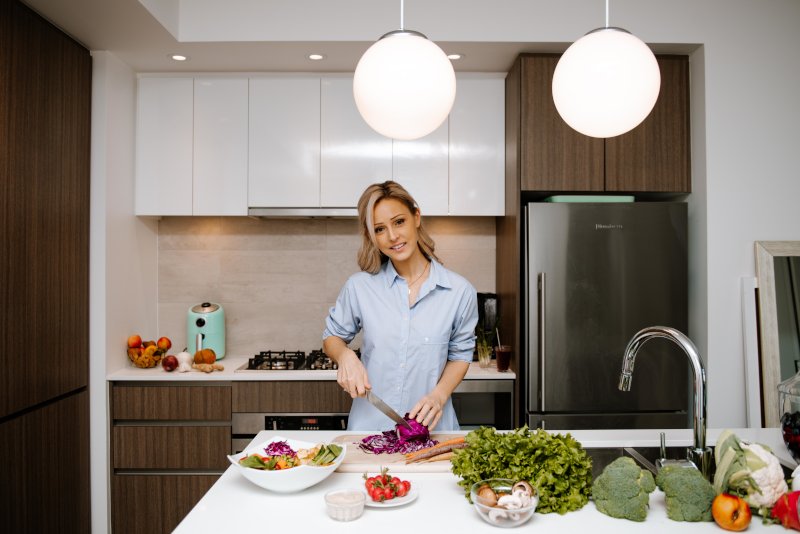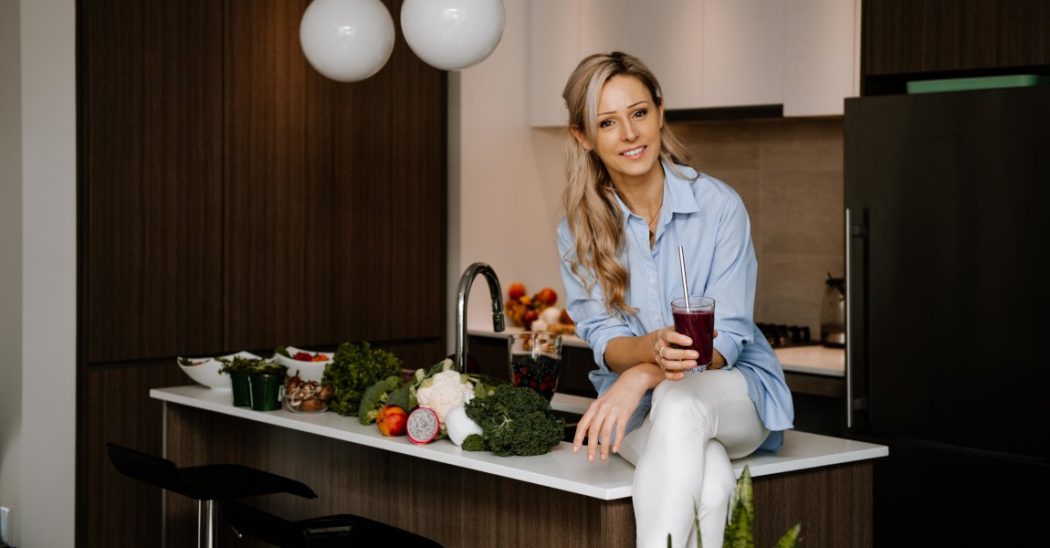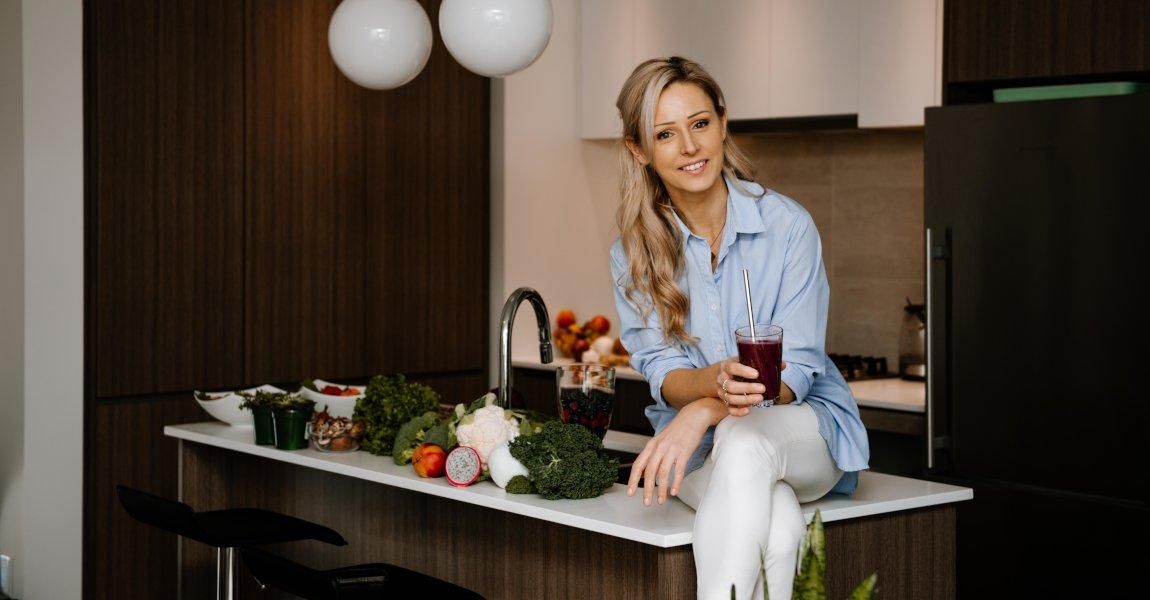I am having a mid-life crisis. Now that I’ve passed the age of fifty, I am laser focused on my health. If you’ve read my previous articles, you know that I lead a primarily chemical-free lifestyle and follow a clean, plant-based diet. Good for me! On the other hand, I’ve only recently started a regular workout routine that includes weight lifting after years of using daily dog walks as my main source of activity. Plus, I work in the wine world so alcohol is a rather important part of my life. Not so good for me.
The fact that cancer will hit one in two Canadians looms large in my mind. Alcohol was recently outed as being a Group 1 carcinogen (meaning no amount is safe) alongside processed meats such as bacon—sorry folks. Yet no one is raising the alarm bells. We’re not inundated with weekly stories warning you to avoid these items, which by the way are as dangerous as asbestos, tobacco and radiation.

Let me introduce Hanna Rakowska my new BFF. She’s a cancer survivor who now helps people through a cancer diagnosis and treatment, but focuses on prevention.
1. You’re a cancer survivor, tell us how the diagnosis lead you to your current career.
My experience as a cancer patient led to my career in oncology nutrition as I became increasingly aware of the ignorance around the importance of nutritional support for cancer patients. Optimizing nutrition during cancer treatment should be an obvious part of the treatment, yet many cancer patients exhibit signs of malnutrition. Optimizing nutrition during cancer treatment enhances the effectiveness of medical treatment, minimizes side effects, maximizes recovery and healing, and significantly reduces the risk of recurrence.
It’s simply common sense that nutrition has to be a part of the equation when facing a disease as serious as cancer. Following my own advice during chemotherapy and radiation treatment, I was able to have a different experience than many others. Almost immediately, I started feeling alive again, full of energy, and optimism. My oncologist was amazed. I felt energetic, my mood remained stable, I didn’t experience nausea or vomiting, I didn’t lose much hair. I was given a quarter of the chemotherapy dose that was initially proposed and my blood markers were stable, I recovered remarkably quickly, and I lost steroid-induced weight rapidly. Bearing witness to the incredible ‘side effects’ of nutritional therapy, all I wanted to do was help other people. I became a Registered Holistic Nutritionist and Certified Holistic Cancer Practitioner, completing a degree in health science.
2. You’ve been cancer-free for eighteen years, to what do you attribute this? What do your doctors attribute it to?
I am obsessed with prevention. I attribute my remission to the way I live my life – my diet and lifestyle. The scientific community has established that approximately a third of all cancers are associated with poor dietary habits and up to two-thirds of cancers are caused by lifestyle habits. Additionally, researchers in lab studies have discovered specific cancer-fighting foods suppress cancer cells.
I don’t think about my risk of a recurrence often; I try to live my life in a way that is aligned with what has been shown in the medical literature to reduce the risks. I eat a whole food plant-based diet, exercise daily, practice mind-spirit activities like yoga and meditation, and get acupuncture and acupressure treatments regularly to maintain energetic harmony within my system. I also limit my intake of alcohol and avoid ingredients in cleaning, beauty, and skin care products that have been shown to be harmful to human health. My doctors ‘fired’ me once I reached the five-year mark of being cancer-free.
During these regular check-ups after treatment, I can’t recall any of my doctors inquiring about changes to my lifestyle habits or sharing any insight as to how to support remission through healthier lifestyle habits.
3. Tell us your top cancer-prevention/fighting foods.
Our bodies make defective cells all the time. That’s how tumours arise. Luckily, our bodies are also equipped with several mechanisms that detect and keep defective cells in check. These mechanisms rely on our dietary choices: the foods we consume are the most powerful tools we have to stop cancer in its tracks. Scientists have established anti-cancer properties of foods with the most potent anti-cancer activity, the regular intake of which can be thought of as a preventive, non-toxic version of chemotherapy, harmless to healthy cells while stopping micro-tumours from reaching a stage that leads to disease.

There are several foods that have been scientifically proven to fight cancer. Here are my top five:
1. Cruciferous vegetables, arugula, kale, cabbage, broccoli, broccoli sprouts, bok choy, brussels sprouts, cauliflower, radish, and horseradish contain several cancer-fighting compounds, the most powerful of these being isothiocyanates. When cooking cruciferous veggies, be sure to chop or blend them BEFORE cooking. Once chopped or blended, wait 40 minutes before cooking to allow cancer-fighting compounds to form. Aim for: 1 cup raw, ½ cup cooked, ¼ cup sprouts, or 1 tablespoon horseradish daily.
2. Allium vegetables, garlic, shallots, onions, leeks contain the potent cancer-fighting compound allicin. When cooking allium vegetables, be sure to crush and mince garlic or finely chop onion, then wait 10-15 minutes before cooking, to allow allicin to form. Aim for at least one raw garlic clove or ½ cup raw onion daily.
3. Flaxseed contains cancer-kicking and hormone-regulating phytoestrogens called lignans. Aim for two tablespoons of ground flaxseed daily.
4. Soy, soybeans, edamame, tofu, tempeh, organic soy milk contain phytoestrogens that have been shown to reduce the risk of hormone-driven cancers. Aim for half a cup of whole soy foods daily or 1 cup of soy milk.
5. Turmeric contains hundreds of cancer-fighting compounds, the most well-studied of these being curcumin. Aim for a teaspoon dried, ground turmeric or a quarter inch of turmeric root.
Tip: Apart from the allium family veggies, all other cancer-kicking foods mentioned above can be added to a daily smoothie (unless you’re brave enough to drink your garlic). You can blend raw cauliflower, broccoli, bok choy, broccoli sprouts, flaxseed, soy milk, and ground turmeric into a smoothie and not even know they are there, as long as you add berries and banana to the mix. Also, don’t forget to add quarter teaspoon of black pepper to dramatically increase turmeric absorption.
What foods should we avoid?
A diet that is high in saturated fats, animal protein, and ultra-processed or chemical laden foods appears to amplify cancer growth. Every major type of cancer is associated with this type of unhealthy diet, including breast, colon, gastric, prostate, endometrial, and pancreatic cancers.There are also specific foods and beverages, that have been proven to be human carcinogens:
processed meats, salted fish, and alcohol.When it comes to meat, a great deal of the detrimental effects are the result of cooking. For example, cooking meat at temperatures above 260 degrees F creates cancer causing compounds such as heterocyclic amines (HCA’s) and polyaromatic hydrocarbons (PAH’s). When it comes to processed meats, the World Health Organization has classified these as Group1 carcinogens, as dangerous as tobacco and asbestos. Processed meat, as defined by The American Institute for Cancer Research, is “meat preserved by smoking, curing or salting, or addition of chemical preservatives.” These products include bacon, ham, sausages, salami, corned beef, jerky, hot dogs, deli meat, canned meat, chicken nuggets, and meat-based sauces.
Red meat, including beef, lamb, and pork, is classified as a Group 2A carcinogen, meaning that it probably causes cancer. While the cancer causing effects of processed and red meat are largely attributed to the way they are cooked or processed, raw meat still contains persistent pollutants such as dioxins, that are inherent in the meat itself. By virtue of the animal being higher up on the food chain, these toxins concentrate in animal tissues, and can’t be separated from the meat itself.
Any other tips or advice?
Drink one nutrient-packed smoothie daily to make it as easy to get in as many cancer-fighting ingredients as possible. The ‘Daily Cancer-fighting Smoothie’ (recipe below) is an excellent option.
Keep leafy greens, such as arugula and kale, as well as red cabbage in the fridge at all times to make it easy to add these (finely chopped) to any meal.
If you’ve accidentally cooked your cruciferous vegetables BEFORE chopping or blending them, which destroys a key enzyme that is needed for anti-cancer isothiocyanates to form, simply add a pinch of mustard seed powder to the cooked cruciferous vegetables. Mustard seed powder is a cruciferous vegetable, providing the necessary enzyme that is needed for isothiocyanates to form.
One of the reasons that plant-centered diets have been shown to reduce the risk of many cancers is because they are fibre-rich. Aim for at least forty grams of fibre per day, making sure to eat an abundance of whole grains and legumes especially. Track your fibre intake by using apps such as My Fitness Pal or Chronometer.
For additional evidence-based nutrition guidance around cancer and diet, try your best to avoid information coming from social media influencers or blogs. Instead, go straight to the source of expert, evidence-based nutrition information, such as the World Cancer Research Fund’s website (www.wcrf.org).
Daily Cancer-fighting Smoothie Recipe

INGREDIENTS
1 cup non-GMO unsweetened soy milk (add more milk to reach desired consistency)
1 banana
2 tablespoons ground flaxseeds
1 tablespoon chia seeds
1 cup leafy greens: kale, Swiss chard, bok choy, romaine lettuce
1/2 cup parsley or cilantro (or a mixture)
½ cup frozen or fresh berries blueberries, strawberries, raspberries, or blackberries
½ teaspoon amla (Indian gooseberry) powder
1 teaspoon camu camu powder
½ cup raw broccoli, broccoli sprouts (or freeze-dried broccoli sprout powder), cauliflower, or purple cabbage
¼ teaspoon ground turmeric powder or ¼ inch fresh turmeric root
1/4 inch piece ginger root
Pinch of black pepper
1 teaspoon medicinal mushroom extract powder
½ teaspoon Japanese Sencha or matcha powder
Scoop/serving of organic powdered greens
1 scoop plant-based protein powder
DIRECTIONS
In a high-powered blender, blend all ingredients together.
Daily servings of foods ticked off from my ‘Daily Guide to Cancer-kicking Foods’ (download it directly from my website):
• Cruciferous vegetables 1 serving – you’re done.
• Mushrooms 1 serving – you’re done.
• Berries 1 serving – you’re done.
• Flaxseeds 2 servings – you’re done.
• Turmeric 1 serving – you’re done.
• Citrus fruit 1 serving – you’re done.
• Leafy greens 1 out of 3 servings unless you used 2 cups in smoothie *** Two more servings are needed during the day
• Green tea 1 out of 3 servings ***Two more servings are needed during the day
• Soy 1 serving ticked off out of 2 *** One more serving is needed during the day
• Other fruit 2 servings ticked off out of 3 ***One more serving is needed during the day
Conclusion
The energy and positivity Hanna exudes is contagious and reassuring. While it may seem daunting to follow her dietary guidelines merely due to the amount of strange ingredients (amla, camu camu and so on), once you’ve made a trip to the health store you’re pretty set for a few months. Change is hard, and I’m not chasing immortality but I sure want to be as strong, healthy and mobile as possible for the years I have ahead of me.



